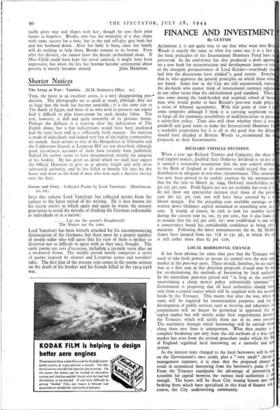FINANCE AND - INVESTMENT
By CUSTOS • ALTHOUGH it is not quite true to say that what went into Br Woods is exactly the same as what has come out, it is a fact the basic principles of the International Monetary Fund have preserved. As the conference has also produced a draft agree on a new bank for reconstruction and development loans—a tri to the energetic persuasiveness of Lord Keynes--everybody sh feel that the discussions have yielded.a good return. Every that is, who approves the general principles on which these sche are based. Some few in the City are still unconverted, espe the die-hards who cannot think of international currency regula in any other terms than the old-fashioned gold standard. There also some among the hard-headed and sceptical school of bus' men who would prefer to base Britain's post-war trade policy a series of bilateral agreements. With that point of view I some sympathy although I think it is carrying scepticism too to forgo all the enormous possibilities of mukilaterialism in purs a safety-first policy. Time also will show whether there is eno goodwill and good sense to make the International Monetary F a workable proposition but it is all to the good that the del should have decided at Bretton Woods to, recommend the proposals to their Governments.
RICHARD THOMAS DECISION
When a year ago Richard Thomas and Company, the sheet and tinplate makers, doubled their Ordinary dividend at io per it seemed a reasonable assumption that the new control em in the Bank of England or its nominees would regard that rate distribution as adequate in war-time circumstances. This assurnr has now been proved to be unduly cautious by the announce that for the year to March 31, 1944, Ordinary shareholders are get 121 per cent. Profit figures are not yet available but even if do not show any spectacular increase over those of the prev year the 121 per cent, rate will have been covered- by a % liberal margin. For the preceding year available earnings on written down Ordinary capital amounted to something over zo cent. It would, of course, be rash to look for another inc during the current year to, say, 15 per cent., but it also looks to assume that the 12f per cent. rat: now established is one w a conservative board has considerable confidence in being able maintain. Following the latest announcement the 6s. 8d. Ord shares have jumped from uis. 74cl. to 13s. 3d., at which the is still rather more than 64 per cent.
LOCAL BORROWING CHANGE
It has been obvious for some time past that the Treasury w need to take fresh powers to ensure its control over the new cap market in the post-war years. There should, therefore, be no surp that as a first step in this direction proposals should now be ,for revolutionising the methods of borrowing by local author In the immediate post-war period and " so long as the condi necessitating a cheap money policy substantially continue" Government is proposing that all local authorities should 110 only from a central source which will be supplied with the neces funds by the Treasury. This means that after the war, when sums will be required for reconstruction purposes and for development of public services such as housing and education, corporations will no longer be permitted to approach the capital market but will merely make their requirements known the Treasury which will satisfy them out of its own resew' The machinery through which borrowings will be carried thr along these new lines is unimportant. What does matter is complete breakaway not only from the old methods of a free cap market but even from the revised procedure under which the of England regulated local borrowing on a turnstile and qu system.
, As the interest rates charged to the local borrowers will be on the Government's own credit, plus a " very small " charge management expenses, it is clear that the proposed change result in economical borrowing from the borrower's point of From the Treasury standpoint the advantage of preventiri8 scramble for capital between the various local authorities is enough. The losers will be those City issuing houses and s broking firms which have specialised, in this kind of finance and course, the City underwriting community.


























 Previous page
Previous page